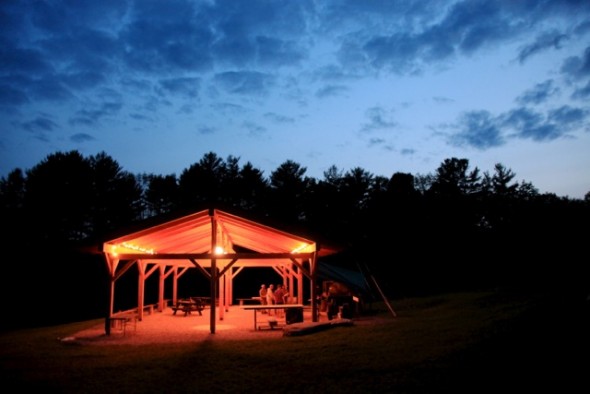Somehow, it always comes back to bread. Maybe it's because of that old metaphor, 'breaking bread'. Maybe it's because a slice of it, fresh from the oven, dressed up in butter and sea salt or naked and steaming, is a meal in itself. There's also something so magnetizing about the hearth, a place that radiates warmth and provides nourishment. Noah, too, fell under the spell of bread, and built Orchard Hill Breadworks to bring people together around a fundamental hunger.
When did you know that you wanted to work in food?
I grew up on a farm and food production has been at the center of my life all along. I discovered baking in the winter of 1994 when I was 17. A family friend who lived a mile from my home had built a wood fired oven in his backyard that fall. In the middle of a snowstorm he called to ask if I wanted to help with the bake that day. His house was literally over a meadow and through the woods (plus a lake) so I strapped on my cross country skis and headed out. The image that stays with me after all this time is skiing up the rise to his house, seeing the glow of the oven fire and smelling the sweet wood smoke as the snow piled up all around. Although it was several years before I was baking for myself, that was the moment baking first grabbed me.
How did you get your current good food job?
I started my bakery, Orchard Hill Breadworks, as a solo operator when I was 20. By almost every measure other than determination, I was unprepared. Thankfully getting the bakery off the ground involved little financial risk. I was able to learn from my mistakes, ask for help from the generous community of bakers in the region, and build a loyal customer base as my baking skills improved.
How did your previous work or life experience prepare you for a good food job?
I was raised by and grew up surrounded by creative, resourceful, inventive people. It was entirely normal in my experience to make for yourself everything from a dwelling to a cider press or bread oven. While I lacked many of the skills I would eventually need in order to succeed, attaining those skills through informal channels (from neighbors, friends and mentors rather than institutions) was second nature. To this day, the thing I value most about sticking with this pursuit is the strong network of allies that form the foundation of everything I've learned and continue to learn.
What was the greatest obstacle you had to overcome in pursuing your Good Food Job dream?
Each phase of business ownership has different demands. For me the startup was exhausting, often confusing but exhilarating at the same time. I was young and energetic, a good match for those needs. Scaling up to a size that could sustain for the long haul was a bigger challenge and I struggled with the real possibility of burnout. Seeing the business grow was satisfying, but there was a significant lag time between that growth and the point where I had built the structures, both physical and organizational, needed to run sustainably. Every business is a dynamic system, so this is a challenge that never disappears entirely but reigning in the imbalance that existed was critical to survival.
Name one positive thing that a former employer taught you that you continue to appreciate?
When I was still in high school, I had a summer job working in a kitchen. On my first day, the chef asked me to wash a case of lettuce. I remember carefully picking individual leaves off of each head and placing them in the wash basin. A few minutes later the chef came back to check on my progress and saw how dreadfully slow I was going. Without making me feel stupid, he showed me how to accomplish the task quickly and efficiently. When new people start at the bakery the biggest challenge for most of them is learning that baking is about both skill and speed. I always try to keep in mind that I, too, needed to learn this once.
What can you identify as the greatest opportunities in food right now?
People are hungry for real, tangible experiences to balance their lives. Food is one avenue where we get out of the abstract, intellectual world that occupies much of our lives, and come back to the physical, sensual nourishment of body and soul. Countless groups and individuals fostered this movement. From Slow Food and CSA's, to Alice Waters, Michael Pollan and Dan Barber, a good percentage of the public understands better now than any time in the past several decades, that food is much more than simply fuel for our bodies. A shocking lack of food culture led us to where we are today, but as the movement grows by leaps and bounds, it is a hopeful time for anyone who recognizes what a vital role good food can play in rebuilding what was lost.
If you could be compensated for your work with something other than money, what would it be?
I find as many ways other than currency to exchange value as I possibly can. A few of these trades I happily barter include bread for beef and pizza for car repairs and lawn mowing. I would love to be paid in free time, and I mean totally without distraction, to spend with my kids, on bike rides or exploring on skis in the woods.









